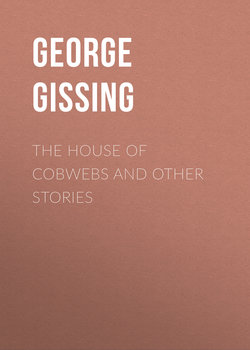Читать книгу The House of Cobwebs and Other Stories - George Gissing - Страница 4
A CAPITALIST
ОглавлениеAmong the men whom I saw occasionally at the little club in Mortimer Street,—and nowhere else,—was one who drew my attention before I had learnt his name or knew anything about him. Of middle age, in the fullness of health and vigour, but slenderly built; his face rather shrewd than intellectual, interesting rather than pleasing; always dressed as the season's mode dictated, but without dandyism; assuredly he belonged to the money-spending, and probably to the money-getting, world. At first sight of him I remember resenting his cap-à-pie perfection; it struck me as bad form—here in Mortimer Street, among fellows of the pen and the palette.
'Oh,' said Harvey Munden, 'he's afraid of being taken for one of us. He buys pictures. Not a bad sort, I believe, if it weren't for his snobbishness.'
'His name?'
'Ireton. Has a house in Fitzjohn Avenue, and a high-trotting wife.'
Six months later I recalled this description of Mrs. Ireton. She was the talk of the town, the heroine of the newest divorce case. By that time I had got to know her husband; perhaps once a fortnight we chatted at the club, and I found him an agreeable acquaintance. Before the Divorce Court flashed a light of scandal upon his home, I felt that there was more in him than could be discovered in casual gossip; I wished to know him better. Something of shyness marked his manner, and like all shy men he sometimes appeared arrogant. He had a habit of twisting his moustache nervously and of throwing quick glances in every direction as he talked; if he found some one's eye upon him, he pulled himself together and sat for a moment as if before a photographer. One easily perceived that he was not a man of liberal education; he had rather too much of the 'society' accent; his pronunciation of foreign names told a tale. But I thought him good-hearted, and when the penny-a-liners began to busy themselves with his affairs, I felt sorry for him.
Nothing to his dishonour came out in the trial. He and his interesting spouse had evidently lived a cat-and-dog life throughout the three years of their marriage, but the countercharges brought against him broke down completely. It was abundantly proved that he had not kept a harem somewhere near Leicester Square; that he had not thrown a decanter at Mrs. Ireton. She, on the other hand, left the court with tattered reputation. Ireton got his release, and the weekly papers applauded.
But in Mortimer Street we saw him no more. Some one said that he had gone to live in Paris; some one else reported that he had purchased an estate in Bucks. Presently he was forgotten.
Some three years went by, and I was spending the autumn at a village by the New Forest. One day I came upon a man kneeling under a hedge, examining some object on the ground,—fern or flower, or perhaps insect. His costume showed that he was no native of the locality; I took him for a stray townsman, probably a naturalist. He wore a straw hat and a rough summer suit; a wallet hung from his shoulder. The sound of my steps on crackling wood caused him to turn and look at me. After a moment's hesitation I recognised Ireton.
